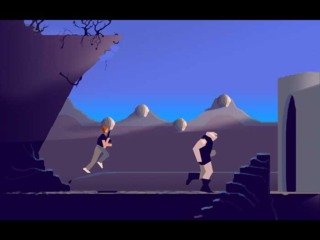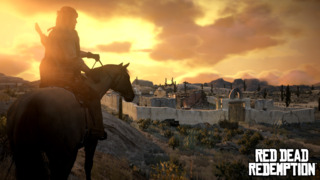In defense of the Redemption
By vidiot 10 Comments
WARNING:
The following contains major spoilers regarding the game Red Dead Redemption. If you have not completed the game's main story up to this point, do yourself a favor and hit that "Back" Button on your browser. I am not accountable for anyone being spoiled regarding....anything.... Now that I mention it, I would like to point out that I am not accountable for anything regarding anything I may write now...In past writings...Or in future writings...Or with writings in the....present?...
Like any individual, with an ego one can document, and measure...From space...I have a cornucopia of biased opinions, some of which are rigidly set in stone. One of these idea's is that video-games, when harnessing story-narrative correctly, can become superior to other entertainment mediums due to an emotional attachment one get's from playing as that character. I know, I'm horrible.

Emotional attachment can be subjective for many. Perhaps you have never felt moved while playing a game, although there's probably a mountain of data somewhere out on the internet that proves otherwise. Your live-journal perhaps? You know, that one entry that you wrote years ago when you saw Aerith die, and the only way you could go to sleep at night was if you smothered your face with your pillow, and you told your friends in school that the reason you were crying was because there was an increase in pollen, but it was winter so they didn't believe you, and they took your lunch money for being weak AND YOU WEPT IN-FRONT OF THAT GIRL YOU KINDA LIKED AND SHE NEVER SPOKE TO YOU AGAIN!
...
...
...moving on....
Then there are the concepts that your active participation in the interactive medium enhances the over-all narrative, Illusions of choice and the like.
Sometimes these very complicated concepts can be misinterpreted. Essay's rallying against the use of cutscenes in games, while at the same time acknowledging games that
As I stared at the credits for Red Dead Redemption, my mind began to wander soaking in the final moments. I thought back to a year ago- during a time when I was reading a ton of editorials about how I was supposed to be impacted by a sequence.
Yeah- I've been down this road more times that I can count, but to fully appreciate the success of Red Dead Redemption's final sequence one should contrast a scene supposedly trying to achieve the same feelings of emotional attachment and participating in a rigid linear-sequence that's "supposedly" made to make you feel bad.
Misinterpretation befell Infinity Ward during the development of the mess that would be Modern Warfare 2's single-player campaign. The base-concept roughly was: "That, If you're doing something bad, then that means you will feel bad about the situation you are in." Why must things always go for the main-characters favor? A proper question one might ask for the evolution of our medium.
I was not "disturbed" by the sequence, nor offended by what was depicted. I was though, upset at how radically tasteless it was, and how I got the impression that the only reason for the inclusion of this sequence was so that the game could have an entire page dedicated to " controversies" on wikipedia. Like I've said before, I can't stand controversy for the sake of controversy, and there was no chief offender than the wasted airport sequence.
The airport sequence in MW2, in theory, was an attempt to radically invest yourself in the game's ludicrous story from a serious point-of-view. To not make you feel comfortable. If there is one thing that sequence did, making me feel uncomfortable it achieved. To my annoyance the sequence was given huge praise by many gaming publications.........................initially. Although like most things that are blinded by hype, and blinding in various giant flaws, this opinion has slowly drifted away. There were moments for me though, of general disgust. People proclaiming that the sequence was a step forward in game narrative. A proclamation that is insulting to many developers who have carried this medium forward, who don't need to have round-table meetings with fifty different people on what the general plot will be for a five hour game.
I'm getting to it. Thanks for sticking with me, you probably see where I'm going with this. Like I said, there is a wrong way to emotionally entrance the player in videogame story development, and then there is a right way.

Red Dead Redemption is not a happy game. (<-Fucking understatement of the year)
It's been a while since I've played a game that was so aware of itself. Within the first few moments, and I do mean moments, of the opening I got chills knowing that the ending was not going to be one where the hero rides off into the sunset. The final arch of the game's story has a constant dread permeating throughout the narrative, there's an uneasy feeling why the game is continuing even when supposedly all of Marstons debt's are finished.
Yes, I was emotionally attached to what was going to happen to Marston. I was rooting for him to get his life back in order but his final stand was something that made me upset, and yet, at the same time: accepting. He accepted it too which was something that made his final moments even more mind-blowing. With all the "wise" decelerations these days online about giving the player freedom to choice, whatever the hell that means, Rockstar decided to cement the fate of John Marston in stone: You can't turn around, you can't decide to not step out that door. John knows that the hunt for him will never end, that if he doesn't die it will be the people he cares for that will be in trouble. You are stripped of interactivity, given a rigid ending, and the whole thing prospers for it.
There! I see it. I see what the commentators were trying to proclaim last year with that stupid airport scene! NO! Not the airport scene, but what they said you were "supposed" to experience, but this time: it's not an excuse for a poorly designed sequence! It's genuine! It makes you feel emotionally horrible, but triumphant, especially in the scene that follows.
It's a scene that laughs at the traditional concepts of what an end for a game should have. It's a scene that has you glued during the sequence throughout, that makes sense contextually with the entire arch of the story. Everything fits nicely, and that's something that I am perhaps most amazed by.
Bravo.

The fate of agent Ross was something that I applauded, not just because it's satisfying to see the villain get what he deserves. While the harshness of the time-period is well represented throughout the entire experience, there is also a reoccurring theme throughout the game of paying up for your past. The final arch of Red Dead Redemption painted the obvious, something that transcends it's historical anchor. It doesn't matter what side of the fence your on: your past actions will come back to haunt you. Ross was given medals, and was able to retire....for a few years....It's all circumstantial, and he looses everything after several gunshots by John Marston's son, Jack. John goes after his old gang, and they all have to answer to their life of crime from John, who in turns answers to his life of crime by Ross. The almost dark, dare I say humorous, inclusion to this cycle with Ross, who is constantly telling you that he is superior to the lawlessness and crime that you (John) represent. In the end of the day, the only difference between him and John's final fate, is that he got to wear a shiny suit.
Yet John achieves something that Ross couldn't hope for: Redemption.
Spotty morality system aside, the core of John Marston's character is clearly defined as someone who want's to make amends for his violent life. He knows that his final moments will be violent and unlike Ross accepts his fate willingly. The title of the game is not only some reference regarding Rockstar revitalizing the Red Dead franchise and making amends in regards to Revolver. Red Dead Redemption is description of what the game is about.
Now if only there was a way to switch the character of Jack, back to John. I want to get 100% in this game with the better voice actor.





